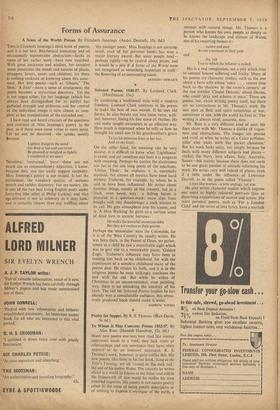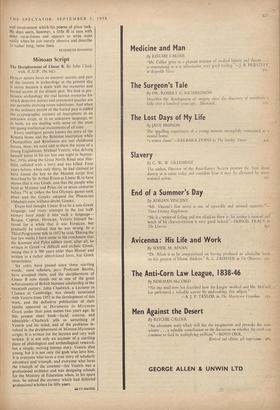To Whom It May Concern: Poems 1952-57. By
Alan Ross. (Hamish Hamilton, 12s. 6d.) MANY new poems one sees now read like uneasy statements made in a void; they lack roots or relationships and any assurance they have often appears to be an imposed assurance. R. S. Thomas's work, however, is quite unlike this. His new poems, like those in his last book, Song at the Year's Turning, are all 'rooted in the, dark soil,' the soil of his native Wales. The country he writes about is a world he knows to the bone, and within the framework of this world he makes his own troubled inquiries. His poetry is not nature poetry either in the sense of being purely descriptive or of striving to express a mystique of the earth, a
oneness with natural things. Mr. Thomas is a person who knows his own people as deeply as he knows the landscape and climate of Wales; one of his recurring themes is :
. . . nature and man At one a moment in their pain
and . . . the tall
Tree to which the believer is nailed.
His is a real compassion, not a pity which tries to conceal human suffering and frailty. Many of his poems are character studies, such as the one ,about a farm wife whose 'voice . . . coaxes time back to the shadows In the room's corners,' or the one entitled 'Chapel Deacon,' about Davies, who could 'pray and scheme at once.' There are poems, too, about writing poetry itself, but there are no abstractions in Mr. Thomas's work. He sees man as flesh and spirit sometimes at war, sometimes at one, with the world he lives in. The writing is always vivid, concrete, sure.
Mr. Ross is a very different kind of poet. He does share with Mr. Thomas a dislike of vague- ness and abstractions. The images are precise and vivid, as when he writes of a Cairo perfume- seller who 'picks teeth like pocket chessmen.' But his work lacks unity, not simply because he deals with many different subjects and places— cricket, the Navy, love affairs, Italy, Australia, Sussex—but mainly because there does not seem to be one great passion or attitude informing his work. He writes very well indeed of places, even if a little under the influence of Lawrence Durrell, as in the poem called 'Vicenza' :
Cities like women—a trite analogy, yet true.
He also writes character studies which impress one more as highly coloured portraits than as discerning explorations of motive and action. His more personal poems, such as "For a London Child' and the series of love lyrics, have a warmth
and involvement which his poems of place lack. He does seem, however, a little ill at ease with strict verse-forms and appears to write most easily when he can merely observe and describe in rather long, loose lines.
ELIZABETH JENNINGS



































 Previous page
Previous page